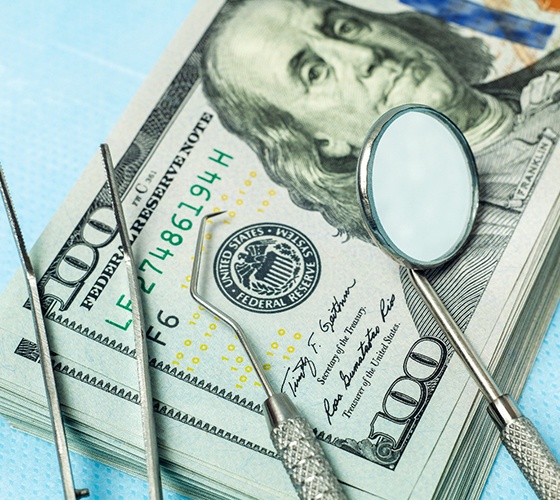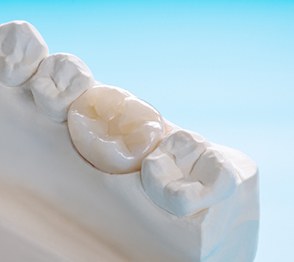Dental Crowns – Austin, TX
Protect Your Tooth from Additional Damage
Your tooth enamel is the strongest part of your body. It’s even stronger than your bones! However, it isn’t completely resistant to damage. Teeth can become injured in a variety of different ways, including decay, accidents, and more. The good news is that if you have a damaged tooth, we can protect it with a dental crown in Austin. At Magnolia Family Dentistry, we provide our patients with porcelain dental crowns to protect their teeth’s integrity and offer a natural-looking appearance. To learn more about dental crowns or to schedule an appointment, contact our office!
Why Choose Magnolia Family Dentistry for Dental Crowns?
- Customized for Each Patient
- High-Quality Dental Materials
- Financing Available
What Is a Dental Crown?

A dental crown is a custom “cap” that is placed over the chewing surface of the damaged tooth to keep it safe from additional harm. Crowns can be made from a variety of different materials. We like to use porcelain because of its durability and natural, tooth-like appearance. Here are some oral health issues that may warrant a dental crown:
- Broken tooth that requires additional support
- Severe decay being fixed with a large filling
- Tooth that is undergoing root canal therapy
- Severely misshapen tooth
- Dental bridge requiring support from adjacent teeth
- Tooth being replaced with a dental implant
The Process of Getting a Dental Crown

Having a dental crown placed is a relatively straightforward process. It can usually be completed in two visits to the dental office. During the first one, we will examine your tooth to make sure a dental crown is the right restoration for you. Once this is confirmed, Dr. Burton will remove a thin layer of enamel from your tooth. This is to allow the crown to fit comfortably in the mouth and appear natural. Impressions will be taken of your tooth. These are sent to the dental laboratory where your crown will be crafted.
Until your next visit, you will be given a temporary crown to protect the tooth and help you get used to what your new crown will feel like. Once your final restoration is ready, you can return to our office. Dr. Burton will place your crown using a special dental cement.
Benefits of Getting a Dental Crown

In addition to preventing future oral health issues, you can experience a variety of benefits by protecting your damaged tooth with a dental crown. Here are some of the most prominent ones:
- Improves your comfort and chewing ability
- Protects your natural tooth to prevent additional damage
- Customized to match your surrounding teeth
- Dental crowns are incredibly versatile, so they can correct many oral health issues
- Caring for dental crowns is no different from caring for natural teeth
Understanding the Cost of Dental Crowns

Even if you want dental crowns, you may think they’re too expensive. Why bother with a treatment you can’t afford? Truthfully, though, the cost of dental crowns varies by patient. You’ll need to see Dr. Burton for a precise estimate. From there, our office will work to make your care affordable. We’ll even explain your crowns’ cost factors and payment options. Keep reading or call our office for more details on these matters.
Factors That Affect the Cost of Dental Crowns

At your consultation, Dr. Burton will examine your mouth. This step gives her a sense of your future crown’s price. In particular, it lets her assess cost factors like:
- Tooth Damage – Depending on a tooth’s damage, a crown will cost less or more. For example, you may only need the cap due to minor chips. Meanwhile, a tooth with severe damage could require a crown and preliminary work. Treatment costs will rise in the latter case.
- Crown Material – In reality, crowns can be made from cheap or expensive materials. Metallic ones tend to cost little, while porcelain kinds are pricier.
- Crown Processing – A normally milled crown shouldn’t cost much. One made with same-day CEREC technology, though, may have a higher price.
Considering the above factors, remember that cheap crowns aren’t helpful. Good oral health often requires high-quality care, which can cost a bit more. Therefore, try to get a functional and enduring crown for your smile!
Does Dental Insurance Cover Dental Crowns?

In most cases, dental insurance will cover dental crowns. Many plans view them as a vital form of medical care. So, a policy usually covers up to 50% of a crown’s cost.
Unfortunately, there are some exceptions to this rule. There’s always the occasional policy that doesn’t cover crowns. Your plan could also have special rules for coverage. Given these facts, make sure to confirm your benefits before treatment. Our office can even help you do so.
Other Options for Making Dental Crowns Affordable

Whether you have insurance or not, it isn’t the only way to afford crowns. Most dental practices today offer helpful financing options. If you find a good one, a high-quality crown can still fit your budget.
For an example, look at our own Magnolia Family Dentistry. We provide flexible financing through CareCredit – a well-regarded financier. Using this service, you could pay for a crown with monthly low-interest installments. That way, you could cover the relevant costs gradually.
As you can see, Magnolia Family Dentistry is eager to offer affordable crowns. So, learn more about the financing by booking a consultation!
Dental Crowns FAQs

Dental crowns in Austin are a trusted solution to improve the health, appearance, and function of compromised teeth. Although they are effective, a crown is a lifelong commitment. It’s normal to have a few concerns, but Dr. Molly Burton will explain everything during your consultation. You can also contact her office to speak with a member of our team or review the most frequently asked questions below.
Are Dental Crowns Permanent?
A dental crown isn’t a permanent fix because it won’t last forever. Eventually, your restoration will need to be replaced. Your tooth must be reshaped to allow the restoration to fit over it. Although this doesn’t harm your tooth, it will be vulnerable to sensitivity, bacteria, and damage if it isn’t always covered by a crown. You won’t have to budget for replacements often by caring for your restoration properly.
Does It Hurt to Get a Dental Crown?
Your dentist may use a local numbing agent to block any discomfort while your tooth is being prepared. You may feel some unusual sensations or pressure, but it won’t hurt. Bonding your crown to your tooth doesn’t cause any discomfort; however, your mouth may be tender for a few days after the effects of any numbing medications wear off. You can manage it using an OTC pain reliever and eat soft foods.
How Long Do Dental Crowns Last?
The average lifespan of a dental crown is about 10 years. Many factors affect the life expectancy of a restoration, like the materials, the location of the tooth, and your aftercare routine. You can ensure your crown lasts for a decade or longer by committing to good oral hygiene. Brush your teeth at least twice daily and floss every day. Limit your consumption of sugars and starches. Avoid any hard or chewy foods to prevent damaging your crown. Besides caring for your mouth at home, visit your dentist in Austin every 6 months for a cleaning and checkup. They will keep your teeth and gums healthy to get the most from your investment.
Can Dental Crowns Get Cavities?
Your dental crown can’t get a cavity, but your underlying tooth and remaining teeth are vulnerable to decay. Bacteria can gain access to your tooth from buildup near your gum line. It can attack your tooth through small cracks that form in the dental cement over time. You can promote a cavity-free smile by avoiding sugary foods and drinks. Brush, floss, and visit your dentist regularly to keep tooth decay at bay.
How Do You Know When a Dental Crown Needs to Be Replaced?
Only a qualified dentist such as Dr. Burton can make an authoritative call as to whether a dental crown needs to be replaced, but there are a few symptoms that can let you know you need to schedule an appointment at her office. A few signs that may mean you need a new crown include:
- Pain: Discomfort in the tooth supporting a dental crown may mean it is infected. In this case, it will be necessary to remove the crown so the decay can be addressed with an appropriate restorative treatment. We may be able to place the same crown back on the tooth afterward, but it may be necessary to replace your restoration.
- Instability: Your dental crown should not wobble about on your tooth after it is placed. If your device seems loose, please contact our office.
- Degraded appearance: A dental crown should keep your tooth beautiful as well as healthy, so stains, chips, or cracks can be reason enough to replace your appliance.
- Dark line around the base: Old porcelain-fused-to-metal crowns may show dark lines around their bases as they age. We’ll be happy to resolve this problem by replacing your device with a gorgeous all-porcelain restoration.
Are Dental Crowns Safe?
Placing a dental crown is a common restorative treatment that should be completely safe as long as it is performed by a qualified dentist such as Dr. Burton. At Magnolia Family Dentistry, we are proud to provide all-porcelain dental crowns that do not contain any heavy metals like mercury. These metal-free restorations also minimize the chances of allergic reactions since porcelain allergies are extremely rare. However, contact our office immediately if you experience gum irritation, redness, or swelling near your dental crown.
Do Dental Crowns Feel Natural?
While you can expect to need a few days to get used to wearing your dental crown, the device should feel incredibly natural after you have adjusted to it. Our porcelain crowns are durable enough to withstand the pressure of everyday chewing, so you should be able to eat comfortably while wearing them. Dental crowns feel so natural in part due to the way the teeth are prepared to receive them, which ensures that the devices fit comfortably and align with the rest of the bite. Each crown from our office is also carefully crafted based on precise measurements of the patient’s mouth so it can be shaped to blend in with the rest of their smile. While you may notice a slight difference in texture when running your tongue along the edges of your teeth, you may find yourself otherwise forgetting that your appliance is even there.
